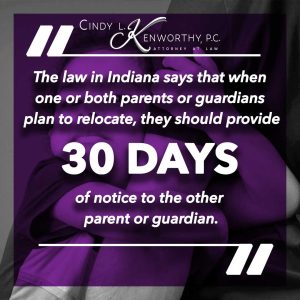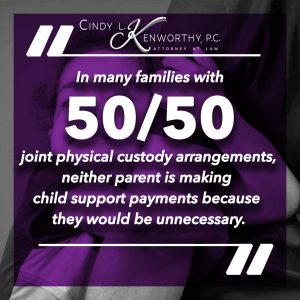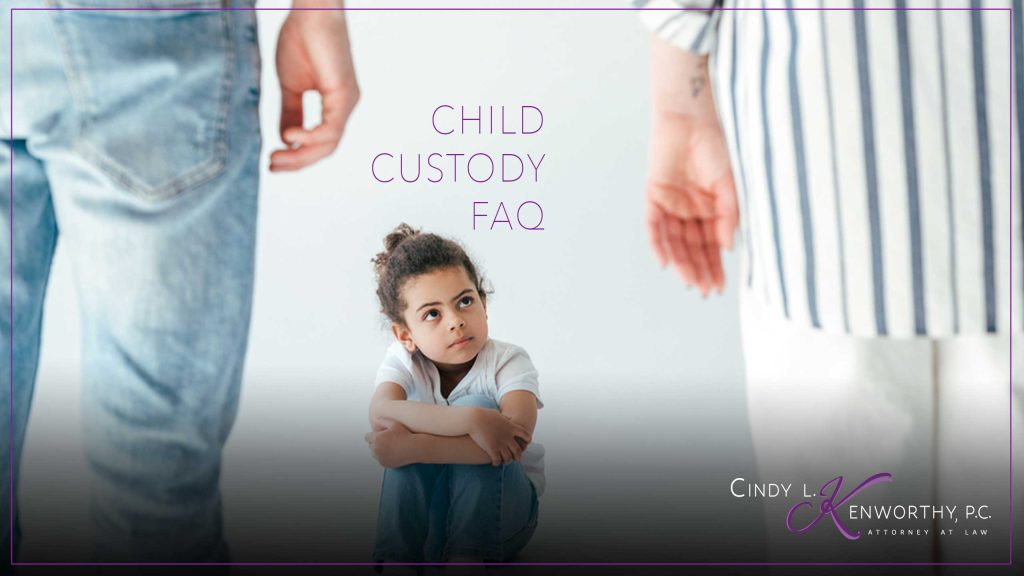Child Custody FAQs
Children are at the heart of a child custody case, adding an emotional charge to a complex situation. Now is a good time to equip yourself with information and learn more about the details of child custody orders, the main forms of custody, parenting time guidelines, and more.
Below are answers to common questions about child custody in Indiana. This information covers only the basics of child custody. Please contact us to discuss your specific circumstances and learn more about your options.
What Is a Child Custody Order?
 A child custody order exists when a judge has reviewed and accepted a child custody agreement submitted by the parties or has heard evidence brought by one or both parties regarding custody of the child. Both parents are legally obligated to follow a child custody order and if there are multiple children in the same family, the custody orders may vary.
A child custody order exists when a judge has reviewed and accepted a child custody agreement submitted by the parties or has heard evidence brought by one or both parties regarding custody of the child. Both parents are legally obligated to follow a child custody order and if there are multiple children in the same family, the custody orders may vary.
Such an order typically covers details like who has physical and legal custody, whether there will be sole or joint custody, who will make decisions regarding the child, how parenting time will be divided, and who will pay child support in what amount, and more.
Learn More: Child Custody
What Are the Two Forms of Custody in Indiana?
 The two main forms of child custody in Indiana are legal custody and physical custody. Legal custody refers to who is entitled to make legal decisions on the child’s behalf, including decisions regarding their educational and medical care. Physical custody addresses where the child will live.
The two main forms of child custody in Indiana are legal custody and physical custody. Legal custody refers to who is entitled to make legal decisions on the child’s behalf, including decisions regarding their educational and medical care. Physical custody addresses where the child will live.
You may also hear the terms sole custody and joint custody. In sole custody, one parent or guardian has full custody. In joint custody, two parents or guardians share custody. When the court approves a child custody order, it will cover these issues.
How Is Child Custody Determined if the Parents Were Never Married?
 When the parents of a child were not married to each other when their child was born, the process starts with one parent filing a petition to establish paternity and asks for, among other things, custody of the child. If a hearing is held, the court will issue orders regarding physical and legal custody, sole or joint custody, visitation and parenting time, child support, and more.
When the parents of a child were not married to each other when their child was born, the process starts with one parent filing a petition to establish paternity and asks for, among other things, custody of the child. If a hearing is held, the court will issue orders regarding physical and legal custody, sole or joint custody, visitation and parenting time, child support, and more.
During the process, each parent will have an opportunity to present evidence showing how they would support and provide for their child. The goal of the hearing is to determine what is in the child’s best interests.
What Are Parenting Time Guidelines?
Indiana Parenting Time Guidelines set out the minimum parenting time for parents. The Guidelines lay out the basics of parenting time, including holidays, special days, school breaks, mid-week, and weekends.
You may also use these Guidelines as a starting point to create a proposed parenting time schedule. You can work with the other parent to create a mutually agreeable arrangement, but a parenting time agreement still must be approved by a judge.
What Do Indiana Guidelines Say About Relocation?
 The law in Indiana says that when one or both parents or guardians plan to relocate, they should provide 30 days of notice to the other parent or guardian. If the move will involve a relocation of more than 20 miles, proposed moves by both custodial and non-custodial parents should involve notice to the court, especially if the move would involve the child changing schools.
The law in Indiana says that when one or both parents or guardians plan to relocate, they should provide 30 days of notice to the other parent or guardian. If the move will involve a relocation of more than 20 miles, proposed moves by both custodial and non-custodial parents should involve notice to the court, especially if the move would involve the child changing schools.
These guidelines exist to protect the child’s best interests and promote their overall well-being. Moving to a new home, school, or city can have a profound impact on a child, so the other parent and the courts may need to be involved in relevant decision-making.
Can a Parent Refuse to Allow Parenting Time if Child Support Is Not Paid?
 Indiana law is clear about the fact that parenting time cannot be denied due to child support being owed. As the Indiana Department of Child Services (DCS) explains, “There is no legal correlation between the payment of child support and exercising parenting time (visitation) rights with the child(ren).”
Indiana law is clear about the fact that parenting time cannot be denied due to child support being owed. As the Indiana Department of Child Services (DCS) explains, “There is no legal correlation between the payment of child support and exercising parenting time (visitation) rights with the child(ren).”
To put it another way, if the other parent has unpaid child support, you have no legal right to deny parenting time. Denying a parent time with a child may negatively impact the child. Failure to allow parenting time due to unpaid child support can also result in a contempt charge being filed against the custodial parent. Instead, this issue should be addressed through the courts with the help of a family lawyer.
Does Anyone Pay Child Support if Parents Share Custody?
 When parents have similar incomes, similar living situations, and share physical custody, there may be no need to have a child support order in place. In many families with 50/50 joint physical custody arrangements, neither parent is making child support payments because they would be unnecessary.
When parents have similar incomes, similar living situations, and share physical custody, there may be no need to have a child support order in place. In many families with 50/50 joint physical custody arrangements, neither parent is making child support payments because they would be unnecessary.
However, if there is a significant disparity in income or life circumstances, the court may approve a child support order. The court will consider each parent’s income, cost of daycare, health care costs, parenting time, and other details. Work with your family law attorney to prepare the proper documents regarding child support.
Can a Child Custody Order or Court Approved Agreement Be Modified?
 A custody order or a court approved agreement can be modified when circumstances have changed significantly. Generally speaking, Indiana courts are not inclined to modify a child custody order or agreement unless the child’s safety or well-being is in question because the child’s best interests are what’s most important. A modification to a child custody plan is unlikely to occur when the request is based only on a parent’s preference or convenience.
A custody order or a court approved agreement can be modified when circumstances have changed significantly. Generally speaking, Indiana courts are not inclined to modify a child custody order or agreement unless the child’s safety or well-being is in question because the child’s best interests are what’s most important. A modification to a child custody plan is unlikely to occur when the request is based only on a parent’s preference or convenience.
Common situations calling for a child custody modification include illness or poor health, allegations of abuse, unsafe living conditions, or when a parent intends to relocate. Work with your family law attorney to request a child custody modification through the courts.
Learn More: Child Custody Modification

Need More Information About Child Custody? Contact Cindy L. Kenworthy P.C.
Cindy L. Kenworthy, P.C. understands that child custody is a deeply personal situation. You deserve compassionate and competent legal representation from experienced family law attorneys.
When you choose Cindy L. Kenworthy P.C., you gain a partner in the process. For more than 30 years, we’ve been helping Indiana people through some of life’s most difficult circumstances to find the best possible outcomes for their children and families.
We’ll bring our expertise, dedication, and discretion to your child custody case. Contact us today at 317-516-0515.

